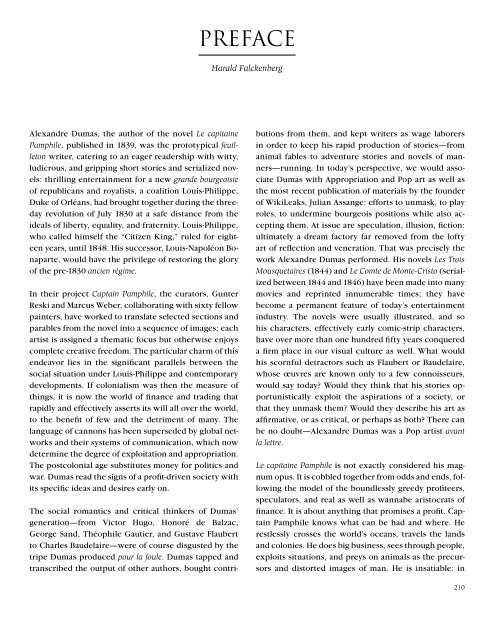EIN BILD ROMAN STÜCKEN A Pictorial Novel In Pieces - Captain ...
EIN BILD ROMAN STÜCKEN A Pictorial Novel In Pieces - Captain ...
EIN BILD ROMAN STÜCKEN A Pictorial Novel In Pieces - Captain ...
Sie wollen auch ein ePaper? Erhöhen Sie die Reichweite Ihrer Titel.
YUMPU macht aus Druck-PDFs automatisch weboptimierte ePaper, die Google liebt.
Alexandre Dumas, the author of the novel Le capitaine<br />
Pamphile, published in 1839, was the prototypical feuilleton<br />
writer, catering to an eager readership with witty,<br />
ludicrous, and gripping short stories and serialized novels:<br />
thrilling entertainment for a new grande bourgeoisie<br />
of republicans and royalists, a coalition Louis-Philippe,<br />
Duke of Orléans, had brought together during the threeday<br />
revolution of July 1830 at a safe distance from the<br />
ideals of liberty, equality, and fraternity. Louis-Philippe,<br />
who called himself the “Citizen King,” ruled for eighteen<br />
years, until 1848. His successor, Louis-Napoléon Bonaparte,<br />
would have the privilege of restoring the glory<br />
of the pre-1830 ancien régime.<br />
<strong>In</strong> their project <strong>Captain</strong> Pamphile, the curators, Gunter<br />
Reski and Marcus Weber, collaborating with sixty fellow<br />
painters, have worked to translate selected sections and<br />
parables from the novel into a sequence of images; each<br />
artist is assigned a thematic focus but otherwise enjoys<br />
complete creative freedom. The particular charm of this<br />
endeavor lies in the significant parallels between the<br />
social situation under Louis-Philippe and contemporary<br />
developments. If colonialism was then the measure of<br />
things, it is now the world of finance and trading that<br />
rapidly and effectively asserts its will all over the world,<br />
to the benefit of few and the detriment of many. The<br />
language of cannons has been superseded by global networks<br />
and their systems of communication, which now<br />
determine the degree of exploitation and appropriation.<br />
The postcolonial age substitutes money for politics and<br />
war. Dumas read the signs of a profit-driven society with<br />
its specific ideas and desires early on.<br />
The social romantics and critical thinkers of Dumas’<br />
generation—from Victor Hugo, Honoré de Balzac,<br />
George Sand, Théophile Gautier, and Gustave Flaubert<br />
to Charles Baudelaire—were of course disgusted by the<br />
tripe Dumas produced pour la foule. Dumas tapped and<br />
transcribed the output of other authors, bought contri-<br />
Preface<br />
Harald Falckenberg<br />
butions from them, and kept writers as wage laborers<br />
in order to keep his rapid production of stories—from<br />
animal fables to adventure stories and novels of manners—running.<br />
<strong>In</strong> today’s perspective, we would associate<br />
Dumas with Appropriation and Pop art as well as<br />
the most recent publication of materials by the founder<br />
of WikiLeaks, Julian Assange: efforts to unmask, to play<br />
roles, to undermine bourgeois positions while also accepting<br />
them. At issue are speculation, illusion, fiction:<br />
ultimately a dream factory far removed from the lofty<br />
art of reflection and veneration. That was precisely the<br />
work Alexandre Dumas performed. His novels Les Trois<br />
Mousquetaires (1844) and Le Comte de Monte-Cristo (serialized<br />
between 1844 and 1846) have been made into many<br />
movies and reprinted innumerable times; they have<br />
become a permanent feature of today’s entertainment<br />
industry. The novels were usually illustrated, and so<br />
his characters, effectively early comic-strip characters,<br />
have over more than one hundred fifty years conquered<br />
a firm place in our visual culture as well. What would<br />
his scornful detractors such as Flaubert or Baudelaire,<br />
whose œuvres are known only to a few connoisseurs,<br />
would say today? Would they think that his stories opportunistically<br />
exploit the aspirations of a society, or<br />
that they unmask them? Would they describe his art as<br />
affirmative, or as critical, or perhaps as both? There can<br />
be no doubt—Alexandre Dumas was a Pop artist avant<br />
la lettre.<br />
Le capitaine Pamphile is not exactly considered his magnum<br />
opus. It is cobbled together from odds and ends, following<br />
the model of the boundlessly greedy profiteers,<br />
speculators, and real as well as wannabe aristocrats of<br />
finance. It is about anything that promises a profit. <strong>Captain</strong><br />
Pamphile knows what can be had and where. He<br />
restlessly crosses the world’s oceans, travels the lands<br />
and colonies. He does big business, sees through people,<br />
exploits situations, and preys on animals as the precursors<br />
and distorted images of man. He is insatiable: in<br />
210


